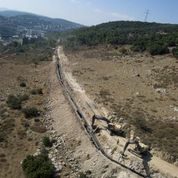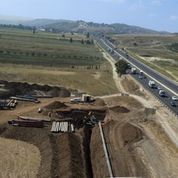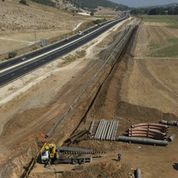January 2014, Vol. 241 No. 1
Features
Israel On The Cusp Of An Energy Revolution

Israel is facing a quandary these days, one that nearly every country in the world wishes it had.
After many years of dreaming of having control of its own natural resources and being energy-independent, Israel now finds itself awash in natural gas reserves with the best yet to come. There are reports that Israel possesses the second-largest deposits of oil shale in the world outside of the United States. Underneath the ground near Jerusalem, into the southern part of Israel in the Negev desert there lies an estimated 400 billion tons of oil shale that contains reserves of unconventional oil which is more than even Saudi Arabia.
So perhaps some 3,500 years ago when Moses led his people out of Egypt and through the desert he had a grand plan in mind, albeit one that would not take shape until now: manna from heaven in the form of fossil fuels that could create the world’s newest energy powerhouse. But before this is realized, a myriad of issues must be confronted: economic, environmental and political.
The heart of this burgeoning energy business is located in the Levant Basin in the eastern Mediterranean Sea about 60 miles west of Haifa. The discovery of offshore natural gas is not new; in fact, the government began planning for development in the 1990s. In 1999 Delek of Israel together with Noble Energy (then Samedan)of the U.S., were awarded an exploratory license and started making discoveries. The first to come online were the Mari-B field and the Noa field.
Their combined 30 Bcm of reserves were mere drops in the bucket compared with what was to come later, starting with development of the Tamar field. Tamar is estimated to hold about 254 Bcm of proven natural gas reserves, equal to about 9 Tcf. Beyond Tamar looms the monster field appropriately named Leviathan with its estimated 535 Bcm or 19 Tcf.
Together the two represent the two world’s largest natural gas discoveries of recent years. Tamar by itself is expected to provide enough gas to supply 50-80% of Israel’s domestic consumption, according to a report from World Review. As if is not enough, on Nov. 26 drillers announced another discovery called the Tamar Southwest which is estimated to have 19 Bcm.

Noble Energy, an independent exploration and production company headquartered in Houston, is the operator for the offshore fields along with local partners Delek Drilling and Avner Oil Exploration. Noble took control of the Tamar drilling license in 2006 shortly after British Gas abandoned its stake. Reports indicated British Gas was frustrated about not being able to reach a deal with the Israel Electric Corporation (IEC) to sell the gas it discovered offshore Gaza in the Gaza Marine deposit, and decided to halt its activity in Israel prior to drilling Tamar.
Nevertheless IEC later reached a deal with Noble that spurred its $3-4 billion development of Tamar in 2010 with commissioning last spring. They have also signed other contracts that will utilize the rest of the capacity.
(According to Wikipedia, production is carried out by five wells connected by a 93-mile-long subsea double pipe tie-back to a gas processing platform located offshore Ashkelon. The total initial delivery capacity is 985 MMcf/d or 7.5 Bcm/a. An upgrade of the supply infrastructure from the processing rig to the onshore reception station in Ashdod is planned by 2015. In the first phase, capacity will be increased to 1,200 MMcf/d and later to 1,500 MMcf/d, with the latter upgrade possibly including the usage of the now-depleted Mari-B field, located nearby Tamar’s processing platform, as a gas storage reservoir.)
Dr. Amit Mor is CEO of Eco Energy Financial & Strategic Consulting Ltd., and is an international expert on natural gas and energy who has worked with the World Bank, international oil & gas companies and with the Israeli government on various energy-related issues. In an interview with P&GJ, he talked at length about Israel’s energy potential and identified three major benefits to be derived from a growing energy base.

Economic Benefits Of Israel’s Energy Base
The first benefit is economic. Mor noted that Israel continues to smash world records for the swiftness in which it is shifting to natural gas for power generation and heavy industry, albeit one limited in scope.
“Ten years ago Israel’s power generation mix was 80% coal, 20% fuel oil and diesel. Today we are already at 50% natural gas and 50% coal. In two years natural gas will increase to 70%, some even think 80%,” he said.
“Coal, most of which is imported from South Africa and Australia, is diminishing very quickly and renewable, notably solar energy, are penetrating slowly. Crude oil and oil products have also had to be imported.”
Therefore, the cost of power generation is about to drop significantly due to the relatively cheap cost of natural gas which, although more expensive than in the U.S. – at about $5.50-6 per million Btu – is still a relative bargain compared to European consumers who pay twice as much for natural gas piped in from Gazprom, the North Sea or Algeria. It’s also just one-fourth of the price of LNG in Asia, Mor said.
Taking it even further, compared to the cost of heavy fuel oil which is $20 per million Btu or diesel at $26-27 per million Btu, natural gas costs one-fourth or less than alternative fuels. So it’s no wonder that power generators and heavy industrial users are switching as fast as they can to gas from heavy fuel oil, gas oil, diesel, and LPG.
In terms of dollars and cents, the result is impressive. Economically, developing its energy industry also will create a sizable number of good-paying jobs.
“Industry will be able to improve its competitive advantage in exports vis-à-vis various goods in Europe and elsewhere as well as compete favorably with the importation of products. We estimate those benefits at more than $10 billion per year,” Mor said.
“The direct benefit to the nation is in the magnitude of about $6 billion per year just in direct fuel cost savings,” Mor said.
Environmentally, natural gas has the obvious advantage of being much less polluting than coal or fuel oil.
Energy Security Benefits Of Israel’s Energy Base
A second important benefit is energy security. Since most of the natural gas will be the primary source in its fuel mix, Israel will be able to drastically reduce its reliance on imported fuels, Mor said. For three years Egypt supplied Israel with some of its natural gas via a Sinai pipeline that was frequently the target of terrorist attacks. Israel no longer receives any gas from Egypt.
The Public Benefits Of Israel’s Energy Base
The public is a major partner in this process. Recent changes in legislation have increased the government’s take in taxation and royalties from 20% to 60% of the profits. This is comparable to most countries, Mor said, with the government (federal and state) take in the United States is between 50-65%; as high as 80-90% in Norway and Egypt.

Legislation also mandates those profits be allocated to a growth fund for the use of future generations to be managed by the Bank of Israel. That could mean the accumulation of about $100 billion during the next 25 years, he said.
Unlike many other countries in which national oil companies represent the government’s interests, Israel is not a partner in resource development. As the major operator and developer Noble and its local partners assume all of the risks and costs of exploration and production. That carries a hefty price tag since they are working in deep waters at a mile depth and beyond; each well costs about $150 million to drill.
The government will regulate the market but has left open the question of controlling the price of gas. This could affect the competitive balance if other operators are to join in the development.
The Knesset sets transportation fees while a government subsidiary transports the gas in high-pressure pipelines from the shore to consumers and also sets safety and environmental regulations. Regional distribution companies are constructing the infrastructure to deliver the gas in low pressure to mid- and small-size industries and other consumers.
Keeping the energy infrastructure safe from Israel’s enemies is complicated and still under discussion because of the huge costs involved. Today the government maintains security over all facilities within the country while security on the offshore platform in Tamar is handled by the operators. How those costs will continue to be handled in the future is another topic of discussion.
Though the Tamar project was completed and commissioned within 30 months, the project was delayed because of heated public discourse about constructing a pipeline from Tamar to the northern part of Israel, then heading 100 miles south where plans were made to build a $2 billion treatment facility. That led to strong opposition from the public to the original plan so developers had to spend another $1.5 billion to build an offshore platform. They were able to utilize the existing pipeline to shore from the depleted Mari-B field.
The public did not get away scot-free as it took an additional year of delays to construct the offshore infrastructure. This came at a critical time – (2011-2012) – when Egypt cut off its flow of gas, creating a major shortage that forced Israel to pay premium prices for alternative fuels and led to electric bill increases of 35% that lasted until Tamar was commissioned and cheap gas became available.
Status Of Leviathan
Ideally, Mor said, the plan would be to develop neighboring Leviathan as soon as possible for domestic use while finding agreement on national security issues for entry of the additional supply. This could include a new pipeline that would demonstrate versatility in the nation’s supply network. The overriding political issue that will ultimately decide the viability of Leviathan concerns how much of that gas Noble and its partners will be allowed to export.
“Leviathan is an export project because the domestic market for the Tamar field can certainly supply most of Israel’s needs for the next 15 years, but for diversification, it is in the best interest of the country to have this developed as soon as possible,” Mor said.
The government recently decided to allocate 40% of future Leviathan production for exports; operators say that’s not enough, while some Israelis insist it is too much. The Supreme Court in October rejected appeals by opponents to block any gas exports.
The debate continues and Noble is getting noticeably edgy. CEO Charles Davidson told a presentation at a financial conference in New York City Nov. 20 that development of Leviathan has been set back a year by the lengthy legal process. Noble had earlier said Leviathan might have gas available for the domestic market in 2016 with exports possible in 2018. That’s now up in the air.
Davidson also was quoted as saying that Noble would prefer selling gas from Leviathan to neighboring countries, such as Egypt and Jordan, since the gas pipeline infrastructure already exists. This would be more economical than building an LNG terminal (most likely an FLNG terminal because of political and environmental opposition in Israel) for sales to the Far East, he said. South Korea has already had talks with Israel about acquiring LNG.
“We will be able to market more gas regionally at lower capital cost because all of these regional markets are basically using pipes, and in some cases, they’re connecting the pipes that already exist,” Davidson was quoted. “We still believe we’ll have a component of LNG in there, but it will probably not be as many trains. It could be floating LNG or it could be LNG over in Cyprus” where Noble is also an active participant.
Though Israel’s natural gas opportunities dwarf those of Cyprus, the country has had little luck inducing larger international companies to join in. Reasons vary, according to experts, and are speculated to include:
1. Israeli gas is found in deepwater reservoirs, creating costly production and transportation problems in getting the gas to shore;
2. the NIMBY issue where many Israelis in a tiny ccuntry governed by a democracy are adamantly opposed to an onshore LNG terminal;
3 Israel’s internal political machine, which has created too much uncertainty for industry executives, and
4. the risk of a boycott by their Arab clients if they sign contracts with Israel.
Mor said Israelis are discussing exporting gas to Jordan and neighboring countries. Jordan also received about 3 Bcm/a from Egypt via the Sinai pipeline. The 2011-2012 interruption effectively put Amman in the dark for weeks and seriously damaged the nation’s economy until the kingdom could switch to fuel oil and gas oil.
“It would make economic sense for them to import cheap gas from Israel but it’s a political decision that has to be made by the king,” Mor said. He also suggested that the Sinai pipeline could be reversed to carry Israeli gas into Egypt, but officials there have already rejected that possibility.
Mor envisioned how gas could be shipped onshore with a pipeline taking the gas into Turkey where it could eventually tie into a grid bringing the fuel to Europe.
Another option is a gas pipeline to Cyprus for liquefaction. On Nov. 7 Cyprus announced an agreement with France’s Total to build an LNG plant. That plan is speculative since Cyprus has not yet developed its own natural gas resources, meaning that for the immediate future at least, it would have to rely on Israeli gas. This presents a political conundrum since relations between Turkey and Cyprus as well as Turkey and Israel are chilly.
Export Possibilities
Once an export policy is locked in place, Mor suggested there are three main options:
1. A pipeline to Turkey would be the most economic, about 400 km, $3 billion, to southeast Turkey in the Ceyhon area. There, a major petroleum port already includes the Baku pipeline which carries oil from Azerbaijan, while another pipeline brings oil from Kurdistan in northern Iraq. From here, an additional trunk line could be constructed for another pipeline being designed to take Azeri gas, and possibly gas from Iran, to markets in Turkey and Europe on a trans-Atlantic pipeline. The Turkish gas market is expected to rise from to 40-43 Bcm in 2012 to 60 Bcm by 2020. Turkey is anxious to diversify and decrease its reliance on Gazprom. Israeli gas could contribute from 8-10 Bcm/a, Mor said.
2. The previously discussed LNG regasification terminal in southern Cyprus, which could include up to five trains to produce the equivalent of 5 million tons of LNG per train (that require 7 Bcm/year per train). If the infrastructure was in place, it could act as a hub for Cypriot gas, Israeli gas, and possibly in the future natural gas from offshore Lebanon, Mor said.
3. The development of new technology using FLNG. This infrastructure could be used for other exploration activities in addition to Tamar and Leviathan, and would be similar to what is being used in offshore Australia. This could be developed by 2020 if proven viable. The technology is extremely costly. However, one big prospective customer is interested: Gazprom has signed a deal as part of a consortium that included the developers to take 3 million tons per annum from Tamar.
Mor said Israel is wise to consider a variety of options. In the best of all scenarios, Israel would export gas to Egypt and to Turkey via pipeline and send off its gas for liquefaction to Cyprus to meet the growing demand in the Far East.
“I really believe these huge deposits of natural gas are a blessing that can help promote, if not peace, at least co-existence in the region for the benefits of Israel, Lebanon, and Cyprus and hopefully when things quiet down, Syria, and also Turkey,” Mor said.
The government had proposed allocating 50% of production for exports before agreeing to drop that to 40%, a minimum figure that Mor acknowledged does not provide any real incentive for companies to continue exploration. With the costs of new projects in the billions, Israel knows it must attract more operators with bigger pockets than Noble. Mor said the country offers attractive opportunities, particularly for mid-sized companies in Europe.
In an earlier interview with an Israeli news service Mor said, “I have no doubt that if we had another four or five companies like Noble, the gas reserves would be developed at a faster rate. The gas industry is still a sort of New Frontier, and stands in great need of companies with know-how and capital. This need will only grow as we enter the world of gas exports, which obliges us to construct liquefaction facilities.
“There are a handful of companies in the world that have the know-how and expertise required to build liquefaction plants. We are talking about massive sums of investment, of $8-15 billion for a plant, involving capital investment by the owners of 20-30%. Noble is the pioneer of the development of the gas industry in Israel and in Cyprus, but projects of that magnitude will be too big for it.”
The Export Debate Lingers
Noble and other prospective operators waited anxiously for Israeli officials to decide on an export quota. Now they have a figure – 40% – but it is not what they hoped for in return for billions of dollars in investments. Oil companies are finding other countries much easier to deal with, experts say. Mor said in his earlier interview that if the government decides to set up an LNG project in Israel with an annual output of 10-15 million tons, it is possible that international companies like ExxonMobil and Royal Dutch Shell, as well as Chinese and Indian companies, will move in.
“Our company did a major study for the government and under the most optimistic scenario through 2040 the domestic market will require about 450 Bcm of gas, and the rest, about 500 Bcm of what we know of proven reserves, could be exported. This is crucial for Israel because if they decide not to allow exports, exploration will immediately cease.
“There is a huge reserve base of natural gas for the next 50-60 years so there is no need to develop more gas for domestic use. If there are enough exports of gas there will be more explorations and the possibility of discovering another base of huge reserves,” Mor said.
“So,” he continued, “on the one hand we want to bring in international investors, but we need to provide them with wide-enough export possibilities; 40% can provide enough to move forward with two or three projects. Once the reserves increase you have more available for exports. In five years the government can review its decision and expand exports if more natural gas is being discovered by then.”
Oil Prospects
The shale revolution represents a strange paradox for Israel. Companies worldwide have embraced the new technology being used to develop unconventional gas reserves onshore, making Israel’s offshore discoveries less attractive in a gas-rich world. Yet that same technology conceivably could help define Israel as a major player in the global oil market.
“It is not a joke; we’ve known this for many years,” said Mor, who in the 1980s served on the board of a government company that used some of the oil to create 18 MW of power and steam. What is now the Israeli Energy Initiative has been working with the Gas Technology Institute in the United States on ways to develop the unconventional shale oil. It is located in relatively shallow layers of rock 200-300 yards deep and can be developed with similar technology now being used in the Alberta oil sands.
Mor said studies have indicated that it would require $35-40 per barrel to break even. While proponents want to start a small pilot test that has already been approved by government agencies in order to prove the technology, they expect to face stiff opposition from local residents and environmental groups who fear that if the technology is proven and shown to be economically viable, a decision may be made for commercial utilization.
“We feel that the public should at least know whether this is technically and economically viable; then it’s up to them in two or three years after we’ve finished the pilot to decide that there might be a case in which there is such a huge resource available for local utilization or even for export,” Mor said.
And there’s an additional caveat: the possibility of developing the oil resource would likely attract some really big players with money left over for offshore gas development.
Ultimately, Israel’s “quandary” of monster energy finds is extremely beneficial for both the country and global industry in terms of economics, energy security and democratic participation in Middle Eastern policy.





Comments